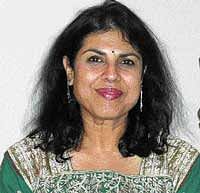The power of storytelling

But the world knows her for not what she teaches, but what she practices in that field. And why not? She has 15 books to her credit, and quite a few of them — Arranged Marriage, The Mistress of Spices and The Palace of Illusions — have earned awards and much accolade. Her stories have delved the deepest recesses of the human mind, sometimes using the path of realism, and sometimes that of mysticism.
But this time, Divakaruni has come up with a novel that is not only a story but also a tribute to the art of storytelling itself. Yes, in her latest novel, One Amazing Thing, Divakaruni’s characters — trapped in a hopeless situation brought upon them by a natural calamity — try to give each other solace by narrating stories from their own lives.
In a way, through those characters, Divakaruni professes her belief in the incredible power as well as the art of storytelling. “The stories the characters tell when trapped in a life-threatening disaster transforms their emotions and their relationships with each other, and that is truly amazing. I am a great believer in the power of stories,” says Divakaruni.
Perhaps it was in her subconscious all these years to pay this tribute to the art of storytelling, as both her grandfather and mother were excellent storytellers. She remembers, particularly, how her grandfather used to follow the “wonderful ritual” of telling the children stories every evening whenever the occasion arose. “He exposed me to the folktales and fairytales of Bengal and our epics and the Puranas as well, which left an incredible mark on me and has deeply influenced my writing,” says Divakaruni.
And she has tried to continue the same tradition with her own children with regular bedtime stories. “I think if we are not careful, we may lose this wonderful tradition in the hustle of modern life,” says Divakaruni, with concern.
One Amazing Thing has a setting that is at one moment mundane but turns surreal during the next. In it, the reader goes into the lives of nine people trapped in the visa office at an Indian Consulate after a massive earthquake in an American city.
The nine are an eclectic mix — two visa officers on the verge of an adulterous affair; a Chinese–Indian woman in her last years; her gifted teenage granddaughter; an ex-soldier haunted by guilt;, an Indian–American girl bewildered by her parents’ decision to return to Kolkata after 20 years; a young Muslim man angry with the new America; and an enraged and bitter elderly white couple. In a way, the setting and the characters reflect the the chaos of the modern, multi-ethnic globalised society. At the same time, it also reflects the growing visibility of India in the global arena.
Divakaruni confesses that it was a challenge to tackle all these multiple angles. “I had to let the story flow, keeping some of these themes at the back of my mind. I had to let the characters and their motives pull these issues into the novel so that they fit organically. Otherwise the novel would have become idea-driven and wooden,” says the author.
Divakaruni, whose work has been translated into 18 languages, and two of whose novels have been adapted onto the screen, says that writing her latest novel has been quite a different experience. “One major difference is that unlike my other novels which have one or at most two protagonists, in this one, all the characters are equally important, and all their stories are equally crucial to the creation of community. It is also more multi-cultural than my other books. It also has a larger number of important male characters than my earlier books,” she points out.
As a writer, Divakaruni believes it is important for creative people to explore pain, something her characters in this novel undergo in great measure. “I feel as an artist it is important for me to explore pain. Pain can help a character to grow, or it can destroy a person. It is in painful moments that the essence of who we really are is often revealed. Without some analysis or depiction of pain, most books would remain superficial,” she says.
Divakaruni might have drawn some inspiration about developing her characters from the wide spectrum of people she interacts with through social networking and blogging. “I took on social media as a challenge from my sons who are now teenagers and think I am completely technology-deficient. I started an author page on Facebook sometime back and I’m surprised by how much I enjoy it. It puts me in touch with readers from many countries. It gives me a sense of what in my writing touches people. I try to respond to everyone who writes in,” she says.
In a sense, she is practising the art of storytelling on this platform too. That is Chitra Banerjee Divakaruni for you, the storyteller par excellence.
Deccan Herald is on WhatsApp Channels| Join now for Breaking News & Editor's Picks